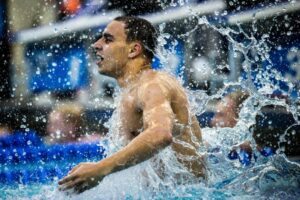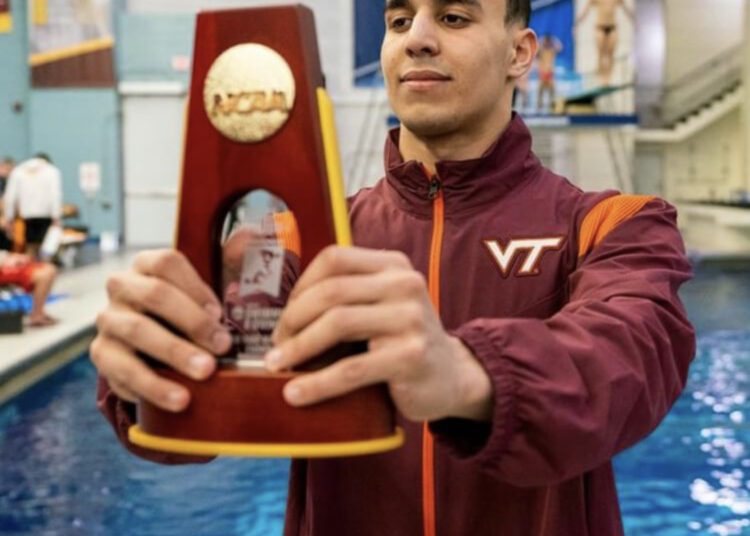Virginia Tech junior Youssef Ramadan always observes the holy month of Ramadan through fasting and prayer, but his Muslim traditions were complicated this year by the 2023 NCAA Championships which started on the same day as the religious holiday.
Ramadan’s win marks the first-ever national swimming title for Virginia Tech, making the Hokies the 72nd school in NCAA history to win an individual men’s championship.
Ramadan’s previous highest NCAA finish came last year, when he placed third in the 100 fly in a tight race with Stanford’s Andrei Minakov and Georgia’s Luca Urlando.
Youssef was unable to fast while competing last week in Minneapolis, where he won the Hokies’ first individual NCAA title and became the second-fastest swimmer ever in the 100 butterfly (43.15).
Ramadan had gotten a good jump from the blocks as he glided effortlessly in the water. He touched the first wall and got ahead of the competition, much to the surprise of the announcers at the event. But it wasn’t a surprise for those on the team and Hokie swim and dive fans who have watched Ramadan closely throughout the year.

The junior has had a spectacular run this season, including an All-American honour during the tournament’s second day. Ramadan was also named ACC Swimmer of the Week during the regular season, along with a gold medal in the 100-yard butterfly at the ACC championships. Ramadan only seems to improve every competition and it should be fun to see what more he can accomplish in his senior season that he hasn’t done already.
Volunteering, performing righteous works, or feeding the poor can be substituted for fasting if necessary, so Youssef opted to observe Ramadan a different way this year.
“I have paid money for people back home who aren’t as lucky and don’t have food, for four meals for four people because I missed four days,” said Youssef, a native of Cairo, Egypt. “When I go back to Blacksburg, I will begin fasting for the rest of the month.”
The holy month of Ramadan begins 10 to 12 earlier each year, allowing it to fall in every season throughout a 33-year cycle, because the Muslim calendar year is shorter than the Gregorian calendar year.
It begins and ends with the appearance of the crescent moon during the ninth month of the Muslim calendar.
Last year, Youssef fasted after NCAAs amid swim practices and into finals season at school.
Fasting is typically broken after the sunset prayer during a meal called iftar that is often shared with friends and extended family.
“Practice was definitely hard, not being able to drink in practice and not being able to eat a big meal after hard sets was definitely hard,” Youssef said of his fasting last year. “And no one celebrates with me at Virginia Tech – some days my friends just try to fast to see what I experience, but that’s about it.
The painful exercise in self-restraint ultimately leaves Ramadan with a lasting feeling of gratitude.
“The suffering you go through really makes you appreciate food and appreciate things that you have,” Youssef said during post-race interviews.
The American universities were the reason for the emergence of many Egyptian swimming champions, including Farida Othman and Marwan Kamash.
In fact, the Egyptians excelled in long-distance swimming, since Isaac Helmy crossed the English Channel in 1928, then Hassan Abdel Rahim in 1948, Abdel Latif Abu Haif in 1953, Nabil El Shazly in 1976 and other heroes who recorded their names in the history of the English Channel.
Ramadan now is joining the list of Egyptian swimming champions at the international level.






Discussion about this post